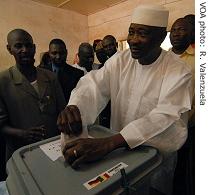2007年VOA标准英语-Malian Authorities Fail to See Humor in Satiric
时间:2019-01-13 作者:英语课 分类:2007年VOA标准英语(六月)
Dakar
21 June 2007
Activists 1 in Mali are protesting the arrest of several newspaper directors, a journalist and a high school teacher for printing a satirical essay about the sexual exploits of a fictional 2 president. Journalists and media freedom activists say the arrests, which they say threaten Mali's democracy, are a surprise in a country that has a good track record in protecting civil liberties. Naomi Schwarz has more from VOA's West Africa bureau in Dakar.
Five journalists and a high school teacher are now in jail over what began as a literary exercise and a joke.
The teacher, Bassirou Kassim Minta, asked his students to write an essay about the escapades of a president of a fictional country.
When Seydina Oumar Diarra, a journalist with the independent daily Info-Matin, published his humorous essay, called "The Mistress of the President," he and Minta were arrested and charged with committing an "outrage 3 to the president."
Other media organizations protested, saying the arrests were unfair.
An editor of the newspaper Les Echos, Moussa Bolly, says its director was arrested, because he chose to re-publish the article to show it contained nothing to justify 4 an arrest.
Two other newspapers, which, like Info-Matin and Les Echos, are seen as tilting 5 toward the opposition 6, also re-published the essay. The directors of all four newspapers, along with Diarra and Minta, are in jail.
Bolly says the press and civil society are mobilizing to fight this attack on civil liberties to show that Mali's young democracy will not accept setbacks.
Multi-party democracy came to Mali in the early 1990s, following the overthrow 7 of the previous, authoritarian 8 president, Moussa Traoré.
Leonard Vincent, head of the Africa desk for the international media watchdog Reporters Without Borders, says Mali has been seen as a model for freedom of expression.
"For several years now Mali has been seen as an example in West Africa in terms of political freedom and especially press freedom," he noted 9. "The press is very free. There are a lot of opposition newspapers, a lot of independent newspapers, private radio, and no major problem has occurred for something like four years now. "
He says the arrests appear due to the action of a single magistrate 10.
"The magistrate has used a procedure where he decided 11 alone to open a procedure against the journalists," Vincent added. "So we have no indication whatsoever 12 that there was a political order."
Bolly says he does not believe the now-infamous article is the real reason for the arrests.
He says many observers believe the journalists were arrested as retaliation 13 for opposition papers' coverage 14 of the recent presidential elections. Some in the president's camp felt the coverage was unfair.
Vincent, of Reporters Without Borders, says whether or not the president was involved in the decision to arrest the journalists, it is imperative 15 that he act.

President Amadou Toumani Toure votes on Sunday 29 April 2007
"He has to intervene," he explained. "He has to say I am not offended. There is no point in pursuing the procedure. Obviously, he has to say that in Mali it is possible to criticize the president. He should be proud, as the president of a democracy, that people can criticize the president without going to jail."
The trial is scheduled for Tuesday. President Amadou Toumani Toure was recently re-elected by a wide margin 16 in an election observers deemed free and fair.
- His research work was attacked by animal rights activists . 他的研究受到了动物权益维护者的抨击。
- Party activists with lower middle class pedigrees are numerous. 党的激进分子中有很多出身于中产阶级下层。 来自《简明英汉词典》
- The names of the shops are entirely fictional.那些商店的名字完全是虚构的。
- The two authors represent the opposite poles of fictional genius.这两位作者代表了天才小说家两个极端。
- When he heard the news he reacted with a sense of outrage.他得悉此事时义愤填膺。
- We should never forget the outrage committed by the Japanese invaders.我们永远都不应该忘记日本侵略者犯下的暴行。
- He tried to justify his absence with lame excuses.他想用站不住脚的借口为自己的缺席辩解。
- Can you justify your rude behavior to me?你能向我证明你的粗野行为是有道理的吗?
- For some reason he thinks everyone is out to get him, but he's really just tilting at windmills. 不知为什么他觉得每个人都想害他,但其实他不过是在庸人自扰。
- So let us stop bickering within our ranks.Stop tilting at windmills. 所以,让我们结束内部间的争吵吧!再也不要去做同风车作战的蠢事了。
- The party leader is facing opposition in his own backyard.该党领袖在自己的党內遇到了反对。
- The police tried to break down the prisoner's opposition.警察设法制住了那个囚犯的反抗。
- After the overthrow of the government,the country was in chaos.政府被推翻后,这个国家处于混乱中。
- The overthrow of his plans left him much discouraged.他的计划的失败使得他很气馁。
- Foreign diplomats suspect him of authoritarian tendencies.各国外交官怀疑他有着独裁主义倾向。
- The authoritarian policy wasn't proved to be a success.独裁主义的政策证明并不成功。
- The local hotel is noted for its good table.当地的那家酒店以餐食精美而著称。
- Jim is noted for arriving late for work.吉姆上班迟到出了名。
- The magistrate committed him to prison for a month.法官判处他一个月监禁。
- John was fined 1000 dollars by the magistrate.约翰被地方法官罚款1000美元。
- This gave them a decided advantage over their opponents.这使他们比对手具有明显的优势。
- There is a decided difference between British and Chinese way of greeting.英国人和中国人打招呼的方式有很明显的区别。
- There's no reason whatsoever to turn down this suggestion.没有任何理由拒绝这个建议。
- All things whatsoever ye would that men should do to you,do ye even so to them.你想别人对你怎样,你就怎样对人。
- retaliation against UN workers 对联合国工作人员的报复
- He never said a single word in retaliation. 他从未说过一句反击的话。 来自《简明英汉词典》
- There's little coverage of foreign news in the newspaper.报纸上几乎没有国外新闻报道。
- This is an insurance policy with extensive coverage.这是一项承保范围广泛的保险。
- He always speaks in an imperative tone of voice.他老是用命令的口吻讲话。
- The events of the past few days make it imperative for her to act.过去这几天发生的事迫使她不得不立即行动。